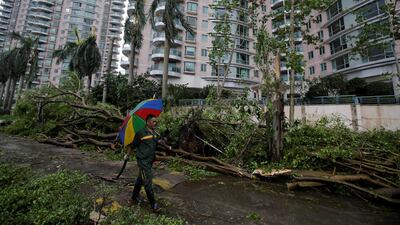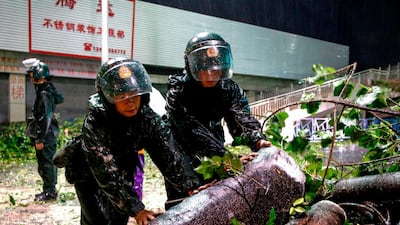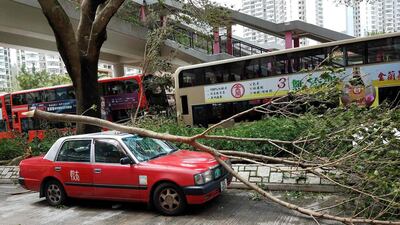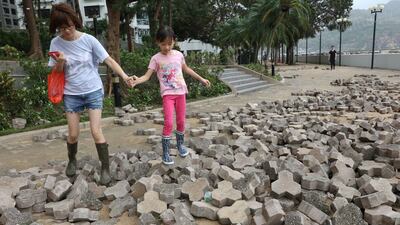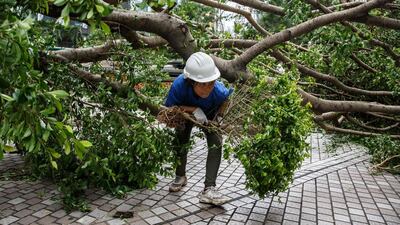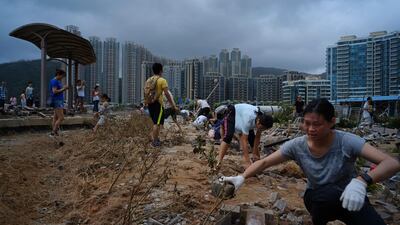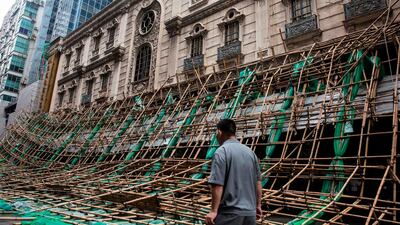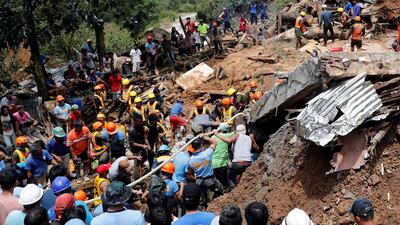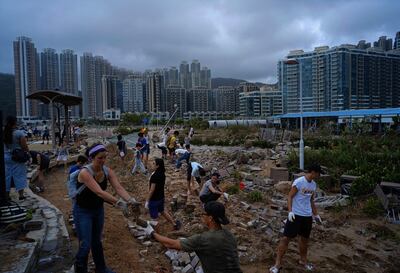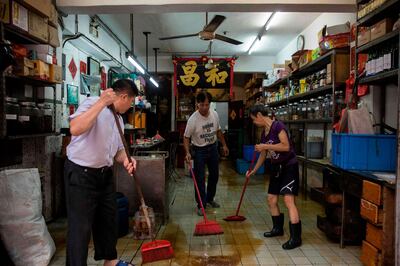Mangkhut weakened from a typhoon to a tropical storm on Monday as it moved deeper into southern China, leaving death and destruction in its path from the Philippines to Hong Kong.
The storm was still affecting the southern Chinese coast, bringing strong winds and rain in the provinces of Guangdong, Guangxi and Hainan. Conditions were expected to continue into Tuesday.
In Hong Kong, a massive cleanup began in the city on Monday after Mangkhut raked the city, shredding trees and toppled construction cranes while bringing damaging flooding to the Asian financial centre.
In the Philippines, the death toll rose to at least 65 people - mostly from landslides - as rescuers pulled more bodies from a huge landslide in the mountain town of Itogon.
The landslide buried an emergency shelter which was being used by miners and their families in the town.
No-one has yet been pulled alive from the rubble and relatives of those buried are taking part in the rescue efforts, the town's mayor Victorio Palangdan said.
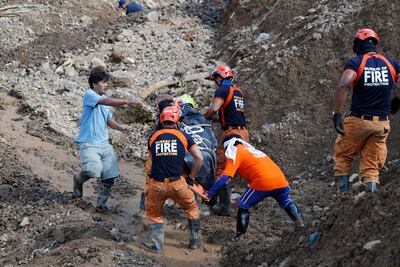
Philippine police spokesman Senior Superintendent Benigno Durana said 43 other people are missing, and more than 155,000 people remain in evacuation centres two days after the typhoon struck.
Farms across northern Luzon, which produces much of the nation's rice and corn, were sitting under muddy floodwater, their crops ruined just a month before harvest.
'We decided not to evacuate'
Many Filipino farmers were faced with a stark choice: stay and attempt to save their crops, or flee.
Residents in Baggao on the eastern flank of Luzon, knew they would be hit full-force, but losing their livelihoods was a disaster they were willing to risk everything to prevent.
"Our house was blown away. We were flooded," Diday Llorente, 55, said. "But we did not evacuate because we didn't want to leave our carabao [water buffalo] and livestock."
For most farmers, there is no insurance to compensate for a destroyed crop or dead cattle, and no rainy-day savings to bridge the gap.
"If we think from their perspective, these are really their greatest assets... whatever little they have is all they have," Lot Felizco, country director for Oxfam Philippines charity, said.
"It's really heartbreaking... for people who already live in a very difficult and dangerous situation. What choices do they have?"
Aida Acopan, 59, evacuated from her home during the last massive storm that struck the area, 2016's deadly Typhoon Haima. She survived, but at a cost.
"Someone broke into my house and stole half a cavan of rice [about 55kg]. So I didn't want to take any chances this time," she said.
"We decided not to evacuate," she said, standing outside her battered, but still standing home of concrete blocks and wood.
Four dead in China
After tearing through Luzon and pummelling Hong Kong and Macau, the storm made landfall in mainland China late on Sunday, killing four in Guangdong province. Three were killed by falling trees.
Authorities there said they had evacuated more than three million people and ordered tens of thousands of fishing boats back to port before the arrival of what Chinese media had dubbed the "King of Storms".
In Hong Kong, the government described the damage as "severe and extensive" with more than 300 people injured in Mangkhut, which triggered the maximum "T10" typhoon alert.
The monumental task of cleaning up the city began as residents, some in suits and ties, struggled to get back to work on roads that remained blocked by felled trees, mud and debris.
Schools were closed, bus services halted, and travel disruption saw commuters piling onto platforms trying to board infrequent trains after trees fell on overhead lines.
Landslides and severe flooding affected some areas, with over 1,500 residents seeking refuge in temporary shelters overnight.
Floods and debris
The storm, with gusts of more than 230 kilometres per hour, sent buildings swaying and waters surging into homes and shopping malls in Hong Kong, with some roads waist-deep in water.
Windows in tower blocks and skyscrapers were smashed as people cowered inside.
In the neighbourhood of Heng Fa Chuen, thousands of rocks and pebbles from the sea covered parkland along the coastline which had been battered by waves.
Low-lying fishing villages were also badly affected after seawater swept through.
Streets in the seaside village of Lei Yue Mun were covered in debris and glass as residents picked their way through.
The city's main Victoria Park had become an obstacle course with hundreds of trees down and many completely uprooted.
Emergency teams were sawing apart some of the biggest trees blocking roads and pathways across the city in a clean-up operation that is likely to take days.
_______________
Typhoon Mangkhut
Fearful Filipinos in UAE unable to contact home after typhoon batters country
Editorial: Twin tales of extreme weather are a stark warning
Super Typhoon Mangkhut threatens Hong Kong after killing 25 in the Philippines
Typhoon Mangkhut makes landfall in China as Philippines death toll spikes
_______________
In the neighbouring gambling enclave of Macau, all 42 casinos shut down for the first time in its history as the storm approached.
They opened again on Monday but Macau was still in recovery mode after severe flooding hit parts of the city, forcing emergency workers to rescue people from their shops and homes using boats and jetskis.
As the storm moved past the enclave Sunday, streets became submerged under water gushing in from the harbour.
On Monday morning, shopkeepers in Macau were hosing down their stores which had been left caked in mud after the flood waters receded.
People were attempting to dry out cupboards and electrical appliances on the streets as police and volunteers helped with the clear-up.
The government and casinos took extra measures ahead of the storm, determined to avoid a repeat of Typhoon Hato which battered Macau last year, killing 12 people and drawing accusations the city was ill-prepared.
In Guangdong province, trees fell and some streets had ankle-level flooding.
Residents in Yashao village moved debris and branches off the roads for collection by a rubbish truck. A large billboard was blown down on the side of the road.
"I was scared. I didn't dare go out last night. At one point the flooding was this high," said villager Zhen Jingli, 62, pointing to his waist.
